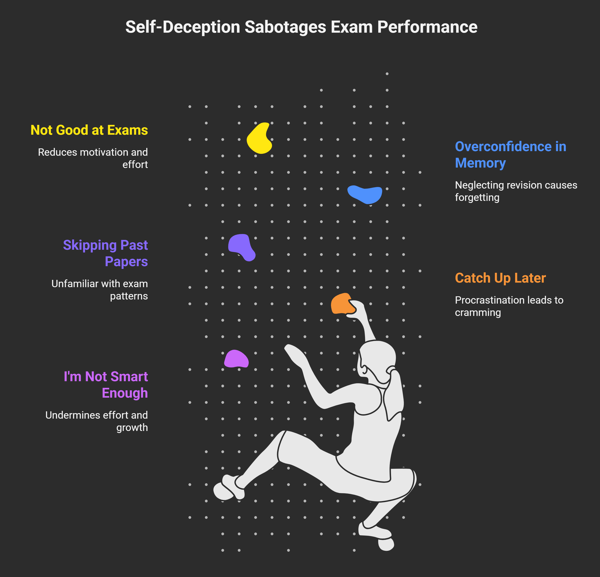5 Lies You Tell Yourself That Stop You From Scoring High in Exams
- Sep 24, 2025
- 2 min read

5 Lies You Tell Yourself That Stop You From Scoring High in Exams
Introduction
How we think about ourselves and our studying deeply impacts exam outcomes. Many students unknowingly buy into limiting beliefs—or lies—that create mental barriers and sabotage their performance. Recognizing and challenging these lies is key to unlocking your full potential.
Lie 1: “I’m Not Smart Enough”
Thinking intelligence is fixed or insufficient leads to self-doubt and reluctance to tackle difficult material.
Reality Check: Intelligence grows with effort and effective strategies; everyone can improve with consistent work.
Lie 2: “I Can Always Catch Up Later”
Procrastination disguised as optimism often results in rushed, last-minute cramming with poor retention.
Reality Check: Early and steady preparation prevents burnout and builds deeper understanding.
Lie 3: “I Don’t Need to Practice Past Papers”
Ignoring past papers limits familiarity with exam patterns, costing easy marks.
Reality Check: Past papers are crucial for exam readiness and help time management and question strategy.
Lie 4: “I’ll Never Forget This Subject/Concept”
Overconfidence in memory leads to neglecting revision, causing surprise in exams.
Reality Check: Regular review solidifies memory; spacing repetition is proven to boost retention.
Lie 5: “I’m Just Not Good at Exams”
Believing exam failure is inevitable reduces motivation and effort, becoming a self-fulfilling prophecy.
Reality Check: Exams test strategy and preparation as much as knowledge; mindset matters.
Conclusion
Discarding these 5 lies transforms not just exam preparation but self-confidence and motivation. Replace self-deception with positive beliefs and watch marks rise alongside your newfound mindset.
10 Student Questions with Answers
Q: How can I stop endless social media scrolling during study time?
A: Set specific time limits for social media or use app blockers when studying to avoid distractions.
Q: Why is multitasking with distractions harmful to my study?
A: Dividing attention lowers learning efficiency and prevents deep focus on the material.
Q: What should I do if I’m not in the ‘perfect’ mood to study?
A: Start small tasks anyway; motivation often comes after beginning rather than before.
Q: How can I balance breaks without losing study momentum?
A: Take short, scheduled breaks (5-10 minutes) every 25-30 minutes, avoiding frequent unscheduled pauses.
Q: Why is avoiding difficult topics during study sessions a bad habit?
A: It creates gaps in knowledge that could cause unexpected problems in exams.
Q: What’s the best way to take notes effectively?
A: Summarize information in your own words, use diagrams, and apply active recall techniques.
Q: How do clear daily goals improve my study productivity?
A: They keep you focused, prevent drifting, and ensure you complete important tasks systematically.
Q: Can using app blockers really increase my productivity?
A: Yes, they help remove temptation and minimize distractions from social media during study.
Q: How do I begin studying if I keep procrastinating waiting for motivation?
A: Commit to just 5-10 minutes of work; this often kickstarts longer productive sessions.
Q: How do I make sure my break times don’t turn into long distractions?
A: Set alarms for breaks and return promptly to study tasks to maintain rhythm. #ExamSuccess #SelfBelief #ExamMindset #StudyMotivation #OvercomeLimitingBeliefs #AcademicPerformance #StudentTips #ScoreHigh #ExamPreparation #MindsetMatters #ConfidenceBoost



_edited.jpg)


































monero miners monero miners
monero miners monero miners
monero miners monero miners
monero miners monero miners
monero miners monero miners
monero miners monero miners
etc mining etc mining
monero miners monero miners
monero miners monero miners
monero miners monero miners
monero miners monero miners
monero miners monero miners
monero miners monero miners
etc mining etc mining
monero miners monero miners
monero miners monero miners
monero miners monero miners
monero miners monero miners
monero miners monero miners
monero miners monero miners
etc mining etc mining
monero miners monero miners
monero miners monero miners
monero miners monero miners
monero miners monero miners
monero miners monero miners
monero miners monero miners
etc mining etc mining
monero miners monero miners
monero miners monero miners
monero miners monero miners
monero miners monero miners
monero miners monero miners
monero miners monero miners
etc mining etc mining